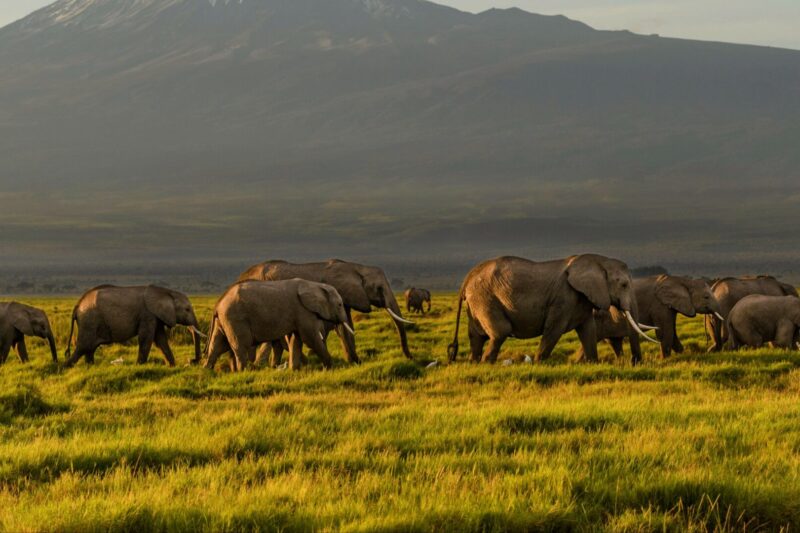Farmers are pleading with the Borno State government to complete the trenches it started digging, saying that is the only way to prevent elephants from destroying their crops.
Farmers in Kala-Balge are pleading with the Borno State government to finish digging trenches to prevent roaming elephants from trampling and destroying their lands and crops.
They say the elephants have been sighted and have already crossed the Chari River which flows through Chad into Lake Chad and follows the Cameroon border from N’Djamena.
The migratory elephants are an annual nightmare for farmers. Every year the elephants move back and forth from neighbouring Cameroon using routes through the Kala-Balge and the Ngala local government areas. They trample and graze the crops and often destroy vast tracts of farmland.
In May, the Borno State government ordered that wide trenches be dug on the outskirts of Kala-Balge to prevent the migratory elephants from trampling and destroying farms.
But ministry of agriculture workers were unable to complete the trenches because of wet and muddy conditions.
Farmers are expecting bumper harvests this year but they fear the elephants will trample their profits away.
They are pleading with the government to finish what it started to prevent the elephants from wiping out their crops.
The seasonal farmers say the trenches are necessary because they cannot afford effective electric fences to keep the elephants at bay.
They say their livelihoods are at stake – and the destructive elephants also pose a threat to food security because they trample and graze most of their produce.
The “marauding” elephants not only pose a threat to their farmlands and crops – their livelihood – but also to themselves. In the past, elephants have trampled and killed farmers who were trying to stop them from destroying their lands.
Expanding human settlements, agricultural development and infrastructure construction have resulted in the fragmentation of the elephants’ habitat.
The farms are a tempting source of food for the elephants, which are capable of wiping out hectares of crops in a short time.
The elephants, which have been using the same migratory routes for years, have learnt to overcome common deterrents, such as hedgerows, and most poor farmers cannot afford effective electric fences.
Farmers have tried beating drums or beaming torches at the elephants to try to dissuade the herd from approaching but these methods have proved ineffectual – the elephants might leave but they often return when the farmers are away from their lands.
Bana Ibrahim, a farmer from Rann town, the headquarters of the Kala-Balge Local Government Area, told RNI that roaming elephants had destroyed his lands and produce for the past five years.
“The elephants cross into Nigeria from Cameroon and Chad. They usually arrive as harvest time draws near when the crops are starting to ripen.
“So far, we have not seen any elephants but we know they will come as they do every year.
“Most farmers have planted hectares of maize and other crops. We’re hoping for a bumper harvest this year. There has been good rain and the crops are doing well.
“In the past, heavy downpours have left the land too muddy and our harvests were poor. But this year we’re expecting a good harvest.
“But that will only happen if the elephants are kept at bay. We heard that the elephants have already started crossing the Chari River. We hope this time around the elephants will not cross into Kala-Balge but there is no guarantee.
“The Borno State government started digging trenches on the outskirts of the Kala-Balge and Gamboru Ngala local government areas to prevent elephants from reaching our lands. But workers did not finish because of rainy weather and muddy conditions.
“That’s why we are pleading with the government to finish what it started. We cannot afford to have our harvests trampled and destroyed. We are asking the government to complete the trenches before it is too late.”
Ya Fanna Mohammed is a farmer in Gamboru Ngala. She told RNI that more women were farming this year because of the cost-of-living crisis.
“People across the state are starving. We have to farm to eat. This is our only source of food. If the elephants destroy it, we will not have any food to eat.
“Some of us are even farming inside forest areas which we have not done for 10 years because of insecurity. But even the threat of attacks by insurgents has not stopped us this year.
“Now, as the harvest period is approaching, it is the fear of elephants destroying all our hard work and all our produce that is really scaring us. We are expecting a bumper harvest this year. We need the food to eat and to sell. In the present tough economic climate, a good harvest is the only thing that will get us through.”
SHETTIMA LAWAN MONGUNO









